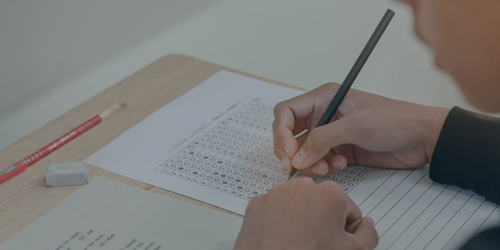Institute of National Importance Combined Entrance Test (INI CET) is introduced as the new Post-Graduate (PG) Medical Entrance Exam for 2021 admissions.
PGIMER 2020 Exam Highlights:
| Conducting Body | Post Graduate Institute of Medical Education & Research |
|---|---|
| Official Website | pgimer.edu.in |
| Course Offered | DM, M.Ch, MHA, Ph.D., House-Job, M.Sc/M.Sc(MLT), MD/MS |
| Mode of Exam | Offline |
| Medium of Exam | English |
| Duration of Exam | 180 mins |
For B.Sc Nursing:
1- Admission to UG programs is made once a year and applications are generally invited in June/ July every year. The entrance test is conducted in Chandigarh in the month of August.
2- Admit card for eligible candidates appearing for the test is made available for download on the university website 15 days in advance.
3- The test will consist of 100 objective type questions with negative marking of ¼ for each wrong answer.
For M.Sc Nursing:
1- The entrance exam is usually held in the month of July every year at Chandigarh.
2- Candidates can download the admit cards from the institute website by logging in with their respective login ID and password.
3- The entrance test is conducted in English and consists of 100 MCQs with negative marking of ¼ for every wrong answer.
For Postgraduate And Ph.D. Courses:
1- PGIMER entrance test for admission to various postgraduate and doctoral programs will be conducted in the month of November/ December across multiple centers in Chandigarh.
2- Admission to post doctoral and postgraduate courses conducted at PGIMER is made twice a year. The sessions commence from first January and first July.
3- The admission to the courses is made on merit on all-India basis by holding an entrance examination by the institute, after issuing a countrywide admission notice.
PGIMER 2020 Schedule
It is very important for the students to check the official schedule so as to avoid any confusion in dates. The students can check table given below or the official website for the latest schedule of PGIMER Entrance Exam 2020. The schedule consists of the important dates of registration opening and closing, exam, result declaration, counselling, etc. If there is any change in the schedule then, the conducting authority of the exam, Post Graduate Institute of Medical Education & Research will notify it on the official website, the same will also be notified here.
January session:
|
Events |
Dates |
|---|---|
|
Starting of Online Registration Starts |
October 26,2019 |
|
End of Applications Submission |
November 14, 2019 |
|
Admit Card download |
Third week of November 2109 |
|
Exam Date |
November 30, 2019 |
|
Declaration of Result |
December 9, 2019 |
|
1st Counselling |
December 16, 2019 |
|
2nd Counselling |
January 10, 2020 |
|
3rd Counselling |
January 24, 2020 |
July Session:
| Events | Tentative Dates |
|---|---|
| Starting of online registration starts | March 17,2020 |
| end of application submission | May 6,2020 (Extended) |
| Admit Card download | May 13,2020 |
| Exam Date | May 14,2020 |
| Declaration of Result | May 16,2020 |
| 1st counselling | June 16,2020 |
| 2nd counselling | July 14,2020 |
| 3rd counselling | July 28,2020 |
PGIMER 2020 Admit Card:
The admit card for PGIMER 2020 will be released by the authorities. The admit card will be made available on the official website prior 1 week of the entrance exam. The candidates can get the admit card by logging in to the official website with their respective log in credentials. The admit card is a mandatory object for the entrance exam. No candidates will be allowed to appear in the entrance exam without the admit card.PGIMER admit card 2020 was released on November 25
Steps to download the PGIMER admit card 2020:
1- Go to the official website of PGIMER - pgimeradmissions.net.in
2- Login using application number and password.
3- Enter the security code and click “Login”.
4- Click on the admit card link.
5- Check the admit card for errors.
5- Download the admit card and print it.
How to download the PGIMER admit card if you forget the password?
1- On the login page, click “Forgot password”.
2- Enter applicants name, father’s name, date of birth and registered mobile number.
3- Enter the security code and click “Submit”.
4- Reset password and save it for future reference.
Details mentioned on PGIMER admit card 2020
Name of the candidate
Father's name
Mother's name
Date of birth
Category
Application number of the candidate
Date and time of the examination
Details of the exam centre
Instructions printed on the admit card of PGIMER 2020
1- Electronic gadgets such as mobile phone, calculators, smartwatch, etc. are not allowed inside the examination hall.
2- Candidate must not carry any textual matter or teaching material to the examination hall.
3- It is mandatory for all candidates to carry a valid photo Id proof on the day of the examination.
4- In case of any error on the admit card, contact PGIMER Chandigarh immediately.
5- Keep PGIMER admit card safe till the admission process is over.
8 Keys to crack Medical Entrance exams at first attempt
PGIMER 2020 Syllabus:
Candidates appearing in the entrance exam for PGIMER 2020 are advised to go through the syllabus set for the exam before starting their preparation. The exam will mostly focus on testing the candidates' knowledge from the MBBS/BDS programme education. Here are some of the important topics which you should read for the entrance exam: Applied Anatomy, Dermatology, Psychiatry, Forensic Medicine, Applied Physiology, Radiotherapy, Radio-diagnosis, Social and Preventive Medicine, Immunogenetics and Molecular Biology, Ophthalmology, Otorhinolaryngology, Orthopaedics, Applied Biochemistry, Microbiology, Pharmacology, Pathology, Pediatrics, Obstetrics and Gynaecology, Internal Medicine and General Surgery.
| Topics | Sub Topics |
|---|---|
| Pathology | Introduction to Pathology, Cell Injury, Amyloidosis and Calcification, Inflammation and Repair, Circulatory Disturbances, Growth Disturbances and Neoplasia, Immunopathology, Infectious Diseases, Miscellaneous Disorders, Cardiovascular Pathology, Respiratory Pathology, Urinary Tract Pathology, Pathology of the Gastro-Intestinal Tract, Hematopathology, Liver and Biliary Tract Pathology, Lymphoreticular System, Reproductive System, Osteopathology, Endocrine Pathology, Neuropathology |
| Applied Anatomy | Gross Anatomy, Osteology, Muscular System, Arthrology, Cardio Vascular System, Respiratory System, Digestive System, Genito-Urinary System, Endocrine System and Individual Endocrine Glands, Nervous System and its components, Special Sensory Organs, Lymphatic System, Surface Anatomy, Cross Sectional Anatomy Cross sections of thorax, abdomen and pelvis to understand the interrelationship of organs and structures, Microanatomy. |
| Physiology | General Physiology, Nerve–Muscle, Blood, Respiratory System, Cardiovascular System, Gastrointestinal System, Nutrition, Environmental Physiology, Reproduction, Kidney, Neurophysiology, Sensory system, Motor system, Visceral and motivational system, EEG, sleep and higher nervous functions, Special Senses, Yoga |
| Applied Biochemistry | Biological cell, Biomolecules, Enzymes, Metabolic pathways, their regulation and metabolic interrelationships, Carbohydrate metabolism, metabolism of Amino acid, Lipid, TCA cycle and biological oxidation, proteinoids. Regulation of the metabolic pathways, Food assimilation and nutrition, Hormones, Molecular Biology, pH, Buffer, physiological buffer systems, Immunology, Environmental biochemistry, cancer and cancer makers |
| Pharmacology | General Pharmacology, Autonomic nervous system & Peripheral nervous system, Central nervous system, Autacoids, Cardiovascular, Gastrointestinal and respiratory system, Hormones, Chemotherapy, Immunomodulators, Drug therapy of glaucoma and cataract, Treatment of poisoning |
| Microbiology | Introduction to Microbiology, Bacteriology, parasitology, Virology and Mycology, Bacterial Staining and Cultivation, Common Tests for Bacterial identification, Laboratory Diagnosis of Viral Infection, Common Laboratory Methods for Diagnosis of Fungal Infections, Collection of Transport of Samples, Host-Parasite relationship. Bacterial AND Viral Genetics, Immunity to infection, Immunodiagnostic, Vaccines, Sterilization and disinfection, Bacteriology of water and air, Microorganisms associated with gastrointestinal infections (Bacteria, parasites, viruses and fungi), . Gastrointestinal infections caused by parasites. |
| Forensic Medicine | Forensic Pathology, Clinical forensic medicine, Medical Jurisprudence, Forensic Psychiatry, Forensic Sciences, General, clinical, environmental and analytical toxicology. |
| Psychiatry | Behavioral Sciences, Cognitive process and memory, Thinking and problem solving, Intelligence: General concepts and techniques for assessment, Personality (Principles of Personality development) and objective testing of Personality, Introduction and classification of Psychiatric disorder, Aetiology of Psychiatric disorders, Drug and Alcohol dependence, Personality disorders, Counselling and psychological therapies, Psychological testing |
| Obstetrics and Gynecology | Basic Sciences-Normal & abnormal development, structure and function of female & male urogenital systems, endocrinology of reproductive system, Gametogenesis, fertilization, Role of hormones in Obstetrics & Gynecology, Humoral and cellular immunology in Obstetrics & Gynecology, Physiology of normal pregnancy, diagnosis of pregnancy, Anemia in Pregnancy, Carcinoma Cervix, epidemiology, staging diagnostic procedure, treatment of Menopause and related problems, Contraception, Neonatology and Recent Advances |
| Pediatrics | Contraception, Neonatology and Recent Advances, Growth and development, Nutrition, Immunization, Infectious diseases, Hematology, Respiratory system, Gastro Intestinal Tract, Central Nervous System. Cardiovascular system, Genito-Urinary system, Neonatology, Pediatrics Emergencies, Fluid-Electrolyte, Genetics, Behavioral Problems, Pediatrics Surgical Problems, Therapeutics. |
| Opthalmology | Anatomy and development of eye, Clinical methods in ophthalmology, Optics and refraction, Disease of conjunctiva, Disease of the cornea, Disease of the sclera, Disease of the Uveal tract, lens, Glaucoma, vitreous, Retina, Vision and neuro-ophthalmology, Strabismus and Nystagmus, Disease of the lids. Disease of the lacrimal apparatus, Disease of the orbit, Ocular injuries, Basic principles of ocular therapy, Systemic ophthalmology, Community Ophthalmology, Miscellaneous Topics |
|
Radiodiagnosis and Radiotherapy |
Identify and diagnose all aspects of Emergency Room Radiology, Basic hazards and precautions in Radio-diagnostic practices, basic need of various radio-diagnostic tools in medical practice, learn about various imaging techniques, including isotopes C.T., Ultrasound, M.R.I. and D.S.A.,know about radio-active isotopes and their physical properties , identify symptoms and signs of various cancers and their steps of investigations and management |
| Surgery, ENT, Orthopedics, Anesthesia | Diagnose with reasonable accuracy all surgical illnesses including emergencies, Surgical knowledge of head, spine, chest abdominal and pelvic injury, know about various surgical techniques such as venesection, tracheostomy and endotracheal intubation, circumcision, biopsy of surface tumors. Comprehensive diagnosis of common Ear, Nose and Throat (ENT) diseases including the emergencies and malignant neoplasm of the head and neck, use of head mirror, otoscope and indirect laryngoscopy, possess knowledge of various ENT rehabilitative programmes. Therapeutic Orthopedics, knowledge on Splinting, Manual reduction of common fractures and dislocations, recognize metabolic bone diseases. Acquire knowledge on pre-anesthetic checkup and pre-anesthetic medications; simple general anesthetic procedures, anesthetic records, cardio-pulmonary brain resuscitation (C.P.B.R.) methods. |
| Medicine Dermatology and Venereology | Common clinical disorders, drug therapeutics, diagnostic and investigative procedures. Disorders of Pigmentation, Allergic disorders, Papulosquamous disorders, Papule vesicular disorders. Leprosy, Fungal infections, Scabies, Pediculosis, STD, Malignant Skin disease. |
| Social and Preventive Medicine | History of Public Health, Concepts in Public Health, Epidemiology and Research Methodology, Epidemiology of Specific Diseases, Entomology ,Biostatistics , Health planning and Public Health Administration , Nutrition, Environmental Health, Demography, Mental Health and Education Technology , Environmental Sanitation , Demography and Family Planning , Mental Health, Recent Advancements in Public Health and Miscellaneous topics , Sociology ,School, Occupational, Urban Health |
PGIMER 2020 Exam Pattern:
The PGIMER 2020 entrance exam pattern is such that candidates need to attempt 250 questions in 3 hours. The question paper will contain objective/multiple-choice questions (MCQs) and no subjective questions. Candidates are also advised to be careful while answering the questions and complete the exam within the given time limit. However, there will be no negative marking for every question answered wrongly.
| Category | Pattern |
|---|---|
| Mode | Offline mode (Pen &Paper ) |
| Total Questions | 250 |
| Type of Questions | Multiple-choice questions |
| Exam Duration | 3 hours |
| Negative Marking | No negative marking |
PGIMER exam pattern 2020 in details:
Mode of the examination: According to the exam pattern of PGIMER 2020, the examination will be conducted in online mode. The examination will be conducted in a computer-based mode for the first time.
Exam city: PGIMER 2020 will be conducted in various test centres located in Chandigarh.
Duration of the examination: The duration of PGIMER 2020 entrance test will be 3 hours (180 minutes).
Type of questions asked: As directed by PGIMER exam pattern 2020, the examination will have multiple-choice questions. Each question will have five response options. Unlike other entrance tests, the questions asked in the PGIMER 2020 exam may have more than one correct answer. Thus, a candidate can mark multiple responses for a question in PGIMER 2020.
Total number of questions: Candidates will be tested on the basis of 250 questions.
PGIMER exam pattern 2020: Subject-wise weightage:
| Subject | No.of Question |
|---|---|
| Applied Anatomy | 6 |
| Applied Biochemistry | 12 |
| Immunogenetic and Molecular Biology | 10 |
| Applied Physiology | 6 |
| Pathology | 15 |
| Pharmacology | 12 |
| Microbiology | 12 |
| Forensic Medicine | 6 |
| Social and Preventive Medicine | 7 |
| Internal Medicine | 36 |
| Paediatrics | 12 |
| Dermatology | 6 |
|
Psychiatry |
6 |
| Radiodiagnosis | 6 |
| Radiotherapy | 6 |
| General Surgery | 36 |
| ENT | 10 |
| Orthopaedic Surgery | 10 |
| Ophthalmology | 10 |
| Anaesthesia | 6 |
| Obstetrics and Gynaecology | 20 |
PGIMER 2020 Cut Off:
PGIMER 2020 cut off score will be the lowest possible marks a candidate must obtain in order to be eligible for PGIMER 2020 Counselling Process. PGIMER 2020 cut off score will be based on many factors such as:
1- Total number of candidates appeared in the entrance test.
2- Total number of candidates who passed the entrance test.
3- Difficulty level of question paper.
4- Total number of seats.
5- Based on PGIMER 2020 Cut off for various courses, Percentile score will be generated for each candidate, these percentage scores will depend on the relative difficulty of the question paper, and the relative ability of candidates. Percentile scores will be used for deciding the overall rank of the candidates. Actual scores will not be considered further
Marking system:
The marking system in the exam pattern of PGIMER is different from rest of the entrance tests, however, it does follow a negative marking system.
PGIMER question paper comprises of 250 questions. For every question, there are five response options.
Therefore, total number of responses in the question paper = 250 X 5 = 1250
According to the exam pattern of PGIMER, there can be multiple correct responses for a question. PGIMER prepares a key of the responses that are correct and evaluates a candidate basis this key. All the other responses are considered incorrect.
Therefore, in the PGIMER examination,
Total number of correct responses in the examination + Total number of incorrect responses = 1250
Let’s assume,
Total number of correct responses = x = 700
Total number of incorrect responses = y = 550
Candidate ABC appears for the examination and marks 800 responses in the examination. Out of these 800 responses, 600 are correct.
Total number of correct responses marked by Candidate ABC = a = 600
Total number of incorrect responses marked by Candidate ABC = b = 200
Formula to calculate the score in percentage = [a/x – b/y] X 100
Thus, percentage of marks obtained by Candidate ABC = (600/700 – 200/550) X 100 = 49.35
PGIMER 2020 Application Form:
PGIMER registration for the January 2020 session is now closed. The institute started registrations for MD/ MS courses on October 25. The registration of PGIMER 2020 is an online process. PGIMER application form 2020 was also available from October 25. Candidates who wished to appear for the PGIMER 2020 needed to register on the official website to apply for it. The last date to fill the application form of PGIMER 2020 was November 14. Candidates must note that the Institute will not accept the PGIMER application form 2020 by post. In order to submit the application form of PGIMER, candidates needed to pay a registration fee. Those who did not submit the registration fee were not issued the PGIMER admit card. Candidates are advised to save and print a copy of the application form of PGIMER 2020 after the final submission.
Browser requirements for PGIMER 2020 registration
Internet Explorer (version 11 and above) orMozilla Firefox (version 50 and above) orGoogle Chrome (version 52 and above)
Steps to fill the application form of PGIMER 2020 are:
Step 1: Registration
1- Go to the official website of PGIMER - pgimer.edu.in
2- Click on “New Registration”
3- Read the instructions carefully and click on "Close"
4- Enter the details such as
5- Name of the applicant
6- Father’s name
7- Mother’s name
8- Date of birth
9- Gender
10- Category
11- Email Id
12- Set a password and click on “Continue”
13- Verify the details in a prefilled confirmation page
14- Click on “Submit”
System generated application number is sent to the registered email Id/ phone number
Step 2: Fill in details in the PGIMER application form
1- Login using the application number and password
2- Personal information is prefilled into the application form
3- Enter qualifying exam information
4- Qualifying degree
5- Month and year of admission
6- Month and year of passing
7- Marks obtained
8- Maximum marks
9- Name of the institution
10- Institute recognized by MCI (Yes/No)
11- Date of completion of 12-month internship
12- Medical registration (MCI/ State MCI)
13- Medical registration number and date
14- Doing/done PG degree (Yes/ No)
15- In government service (Yes/ No)
1-6 Check the details and click on “Submit”
Step 3: Upload the requisite documents
1- Read the instructions carefully
2- Upload the documents in the correct order
3- Click on “Upload”
Step 4: Payment of the PGIMER registration fee
1- Check the mode of payment available
2- Choose the desired mode of payment and pay the application fee
Step 5: Download the confirmation page
1- Save and print the confirmation page for future reference.
Different modes of payment for the PGIMER registration/ application fee
1- SBI Bank Challan and SBI collect service has been revoked from this year
2- The PGIMER 2020 registration fee can be vis credit card/ debit card/ net banking only.
PGIMER 2020 Application Fee:
| Category | Fees in Rs |
|---|---|
| General/OBC | 1500 |
| OCI/NRI | 1500 |
| SC/ST | 1200 |
| PwD | Exempted |
PGIMER 2020 Counselling:
Students who have successfully cleared the PGIMER 2020 entrance examination will be called for counseling. Students must be physically present at the time of PGIMER 2020 counselling otherwise the seat will be given to other candidates. For MD/ MS course, counseling will begin from December 16, 2019.
Counselling will be held through offline mode only. It will take place in three rounds. Seats will be distributed on the basis of the scores obtained by the candidate in the entrance exam. Students must bring the following list of documents at the time of counselling for verification.
January 10, 2020: The second round of counselling is scheduled for this date. The counselling for PGIMER is being conducted offline. Selected candidates have to report to the Bhargava Auditorium, PGI Chandigarh at 10.00 am to attend the second PGIMER counselling 2020. Candidates who clear PGIMER 2020 exam have to be physically present at the counselling. Requests to send a representative on their behalf would not be entertained. The counselling of PGIMER 2020 will have three rounds. The number of candidates invited for a particular round of PGIMER counselling 2020 will be three times the number of seats available. The list of candidates who will be able to attend this round will be released by the institute soon.
List of documents required for PGIMER counselling 2020
- Copy of PGIMER application form
- PGIMER admit card
- Recent passport-sized photographs
- Valid photo Id proof (Aadhar card/ Voter Id/ PAN Card/ Driving Licence)
- Matriculation Certificate
- Mark sheet of MBBS
- Internship Completion Certificate
- MCI registration
- Category Certificate (if applicable)
- NOC from employer (for candidates in service)
- OBC Certificate (for candidates claiming reservation under OBC quota)
- Certificate from District Magistrate (for candidates claiming reservation under Rural Area)
- PWD Certificate (if applicable)
Process of PGIMER Counselling 2020
Registration and verification:
Candidates who make it to the PGIMER merit list 2020, have to report to the Bhargava Auditorium by 10 am.
Between 10 am to 11 am, candidates have to complete the registration formalities and undergo security procedures.
PGIMER admit card and all the other documents will be verified by the institute.
PGIMER counselling:
Post successful verification of the documents, candidate will be allowed to attend the counselling of PGIMER.
The counselling will be conducted separately for candidates claiming reservation under different categories.
Candidate is called for a face to face interview.
Selection of the candidate will be basis of inter-se merit and performance in the interview.
Submission of the documents and payment of the fee:
The results will be announced soon after the interview.
Selected candidates have to pay the first installment of fees, Rs 2485 in cash. (Other modes of payment like Cheque/ Demand Draft will not be accepted)
If a candidate fails to deposit the fee, his/her seat will be cancelled.
Participating in the second/third round of PGIMER counselling:
If a candidate does not get the desired stream, he/she can participate in the next round of counselling.
Candidates who are not allocated a seat in the first round can also participate in the second/ third round of PGIMER counselling.
PGIMER 2020 Result:
The result for PGIMER 2020 is expected to be released on the 16th of May this year. The result for the entrance exam will be released on the official website of PGIMER. The candidates can log in to the official website to check their results.
Steps to check the PGIMER result 2020:
1- Go to the official website of PGIMER - pgimer.edu.in
2- In the Information for Candidates section, select ‘result for MD/ MS courses’
3- Select ‘Click here for result’
4- Enter roll number and date of birth
5- Click on ‘Search’
6- View the result of PGIMER
What information can be found on the PGIMER result 2020?
1- PGIMER Roll number
2- Name of the candidate
3- Category
4- Percentile score
Types of PGIMER Merit list 2020
Post the declaration of PGIMER result 2020, the Institute will release category wise merit list of the candidates. PGIMER will release ten merit lists, the first one will be an overall merit list, and will contain the names of all the candidates who qualify the examination. The other types are:
1- General
2- Other Backward Classes
3- Scheduled Caste
4- Scheduled Tribe
5- Rural Area Candidates
6- People with Benchmark Disability
7- Sponsored candidates
8- Foreign National
9- Bhutanese National
What will be done if there is a tie between two candidates?
If one takes a closer look at the PGIMER result, he/she will notice that many candidates score equal percentile of marks in the examination, yet have different ranks. This is because the Institute follows a tie-breaker protocol in such cases. The following two parameters help in resolving a tie in the result of PGIMER:
1- Candidate with higher aggregate in the qualifying examination of MBBS will be ranked higher to a candidate who has obtained lower marks.
2- If the aggregate in the qualifying examination of MBBS is the same, then, candidate senior in age will be ranked higher.
To be eligible to participate in the PGIMER counselling, a candidate needs to score the minimum percentile set by the Institute. Those who score less than the prescribed percentile, will not qualify the examination.
Qualifying marks for PGIMER result 2020
| Category | Percentile Required |
|---|---|
| General | 55 |
| Sponsored Candidates | 55 |
| SC/ST/OBC/PwD | 50 |
| Candidates claiming reservation under ‘Rural Area’ | 50 |
| Foreign Nationals | 50 |
| Bhutanese Nationals | 45 |
5 Things to Do Before Choosing Medicine as a career
PGIMER 2020 Eligibility:
The conducting authority Postgraduate Institute of Medical Education and Research, Chandigarh has set a few parameters that candidates have to hold before applying for the PGIMER 2019.
The PGIMER 2019 is going to be held on November 30, 2019, as a qualifying exam to seek admission to MD/MS, MDS, House Job, MSc, DM/MCh.
For MD/MS:
Candidates must have an MBBS from a University or an Institution recognised by the Medical Council of India (MCI).
It is mandatory for candidates to either complete or in progress of completion of the compulsory rotatory internship training on or before December 31st 2018 for January session, and June 30th 2019 for July session.
Aspirants must be registered with the Central or State Medical Registration Council.
MDS/ House Jobs (OHS):
Candidates must be a graduate in Bachelor of Dental Surgery (BDS) from Punjab University recognized by the Dental Council of India (DCI).
It is mandatory for students to be registered with the Central or State Dental Council (MCI).
Note: Those who have already finished House Job in any Hospital or an institute will not be eligible for House Job.
M. Sc. Pharmacology:
Candidates should have completed MBBS or an equivalent from any University or an Institution recognised by the Medical Council of India (MCI).
OR
Candidates should have completed their degree on B.Sc. (in Anatomy, Physiology, and Biochemistry) or B.V.Sc. or B. Pharma from an Institution or a University recognised by the Government of India.
M. Sc. (Respiratory Care):
Aspirants should have completed B.Sc. (in Medical Laboratory Technology, Nursing) or Bachelor of Physiotherapy from an Institution or a University recognised by the Government of India.
A minimum of 55% aggregate in graduation is mandatory for the candidates to be eligible to apply.
Note: Sponsored candidates are required to have a minimum of three years experience in their respective fields, after obtaining their degree.
M.Sc. Audiology and Speech-Language Pathology (ASLP):
Interested candidates should have a degree in B.Sc. (Audiology and Speech Therapy) or Bachelor of Audiology and Speech-Language Pathology.
Candidates should have completed their graduation with a minimum of 50% aggregate.
Note: Sponsored candidates are required to have a minimum of three years experience in their respective fields, after obtaining their degree.
For DM / M.Ch:
Interested candidates should have completed a degree in MD / MS or an equivalent recognised by the Medical Council of India (MCI).
Age Limit for DM / M.Ch.:
| Category | Age Limit(In Years) |
|---|---|
|
general |
35 |
|
OBC |
38 |
|
SC/ST/Ex-Serviceman |
40 |
|
Sponsored/Deputed |
No Limit |
MD (Hospital Administration):
1- Candidates should have completed MBBS from an institution recognised by the Medical Council of India (MCI).
2- A minimum of 3 years experience in a hospital or 5 years in general practice is mandatory for candidates to be eligible to apply.
3- Also, interested candidates must hold a Certificate issued by District Magistrate in support of his/her general practice.
4- The general category candidates should have secured a minimum of 55%, and candidates who belong to reserved categories should have secured at least a minimum of 50% in MBBS.
5- Aspirants should have registered with the Central or State Medical Registration Council.
PGIMER 2020 FAQs:
Q: Who conducts the PGIMER 2020 entrance exam?
A: The entrance exam is conducted by the Post Graduate Institute of Medical Education & Research.
Q: What is the last date to apply for the PGIMER 2020 Exam?
A: The last date to apply for PGIMER 2020 entrance exam is not announced yet.
Q: What is the duration of the exam?
A: The exam will be conducted for 3 hours.
Q: What are the courses offered through PGIMER 2020?
A: The courses offered through PGIMER 2020 are DM, M.Ch, MHA, Ph.D., House-Job, M.Sc/M.Sc(MLT), MD/MS.
Q: What is the application fee for PGIMER 2020?
A: For General/OBC the fee is Rs. 1500 and for SC/ST it is Rs. 1200.
Q: How to download the admit card for PGIMER 2020?
A: Here is the procedure to download the admit card of PGIMER 2020-
- Go to the official website.
- Click on the link referred to as PGIMER 2020 Admit Card.
- Enter your login details, Application Number/User ID and your password.
- Login and download the Admit Card for examination.
- Print the Admit Card on the A4 sheet.
- Keep the Admit Card safe until the counseling process gets over.
Q: What is the question pattern for PGIMER 2020?
A: There are 250 questions with 5 alternatives and one single correct response.
Q: What are the factors affecting the cut off of PGIMER 2020?
A: Here are the factors affecting the cut off-
- The total number of candidates appeared in the entrance test.
- The total number of candidates who passed the entrance test.
- The difficulty level of the question paper.
- The total number of seats.
Q: What is the mode of the exam PGIMER 2020?
A: The exam will be conducted in online mode.











